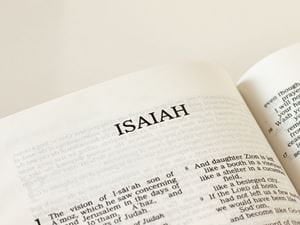
In ancient times, rabbis read Isaiah 53 in synagogues and accepted it as the prophet Isaiah's predictions about the long-promised Messiah. But then something happened. Sometime after the seventh century, rabbis stopped reading the chapter in worship services, and Isaiah 53 became a forbidden chapter in the Hebrew Bible.
Christians and Jews have argued about the meaning of this "forbidden chapter" for centuries, just as individual Jews and Jewish groups have debated it among themselves. Christians maintain that Jesus Christ is the long-awaited Messiah, while many modern-day Jews continue to look forward to his coming. They believe Isaiah 53 refers to the nation of Israel, the children of Israel, or Isaiah, Moses or some other Jewish prophet.
Who Was Isaiah?
Isaiah was an Israelite prophet of God who lived 700 years before the birth of Christ. His home was in southern Israel during a time when the country was divided into northern and southern kingdoms.
The prophet played an important role in Israel's history. He was an educated man who came from a prominent family and served as a minister in the king's court in Jerusalem. He was a religious and political advisor to several Israelite kings, some of whom wanted to do God's will and relied on prophets such as Isaiah to guide them. But other Israelite kings turned their backs on God and took the nation of Israel with them.
Consequently, Isaiah lived through tumultuous times. During his life, the Assyrian army destroyed the northern kingdom of Israel and marched up to the gates of Jerusalem in the south. Isaiah advised the southern king, Hezekiah, not to surrender, and he prayed for the city. God answered the prayers by sending an angel to protect Jerusalem.
In addition to his prophecies in Isaiah 53 (see below), the prophet predicted the fall of Israel's northern kingdom, the rise of Babylon a century before it occurred, the decline of Egypt as a major power, the fall of Jerusalem, and the restoration of the city under King Cyrus.
The Book of Isaiah
Biblical scholars credit Isaiah with writing all or part of the biblical book bearing his name. Some believe that Isaiah wrote all 66 chapters in the book. Others say that the book contains Isaiah's writings along with commentaries written some 100 years after the prophet lived. The remainder of the book, they say, may have been written immediately before and immediately after the Israelites' exile in Babylon between 597 and 538 B.C., per One for Israel. The organization consists of native-born Israelis who share the gospel in their homeland.
Experts believe the book of Isaiah was written before the time of Christ because it was found among the Dead Sea Scrolls. Bedouin shepherds discovered these ancient Jewish texts in caves near the Dead Sea between 1947 and 1956.
The scrolls have been scientifically dated to 150-100 B.C., many years before Christ's birth in about 4-6 B.C.
What Does Isaiah 53 Say?
The so-called forbidden chapter tells us that the Messiah would be rejected by his people. It also says he would be wounded for humanity's transgressions and suffer an agonizing death to atone for the world's sins. He would be resurrected from the dead and ascend into heaven. The book also says that at the end of the day, Israel's leaders would realize that their rejection of Christ was a mistake.
Christians say that Isaiah's prophecies – except for the last one -- have been fulfilled by Christ.
A fourth-century Catholic priest, theologian and historian named Jerome described the prophet Isaiah as "more of an Evangelist than a Prophet, because he described all of the Mysteries of the Church of Christ so vividly that you would assume he was not prophesying about the future but rather was composing a history of past events."
Who is the 'Suffering Servant'?
Several chapters of Isaiah – including Isaiah 53 – talk about the "Suffering Servant." The book of Isaiah describes him as being:
- Sent by God to fulfill a mission
- A servant rather than a conquering hero
- Despised and rejected by humanity
- Punished for our sins
- Oppressed and afflicted
During his suffering, this servant did not open his mouth. Eventually, he would be vindicated and revered, and he would save his people through his suffering rather than through military or political heroics, scholars say.
A Christian ministry called BibleTalk explains Isaiah's prophecy as "an extraordinary passage because of its accuracy in describing the person, the purpose and the promise of God fulfilled through Jesus Christ – all foretold 700 years before His appearance.
"It is incredible because the information contained in this passage could not be applied historically, morally or theologically to any other religious leader in history except Jesus Christ: only he could be the Suffering Servant."
The Debate Over Isaiah 53
GotQuestions, a non-profit Christian organization, noted that "modern Rabbis of Judaism believe that the 'Suffering Servant' of Isaiah 53 refers perhaps to Israel, or Isaiah himself, or even Moses or another of the Jewish prophets. But Isaiah is clear – he speaks of the Messiah, as many ancient rabbis concluded."
The debate over Isaiah 53 became heated, and rabbis decided to leave it out of their synagogues' readings. They now read through part of Isaiah 52 and then move ahead to Isaiah 54 for the next reading.
Thus, Isaiah 53 has become known as the "forbidden chapter."
A Clear Example of Fulfilled Prophecy
From the Christian perspective, an organization called BibleTalk says, "Isaiah 52-53 contains one of the clearest examples of fulfilled prophecy.… Not simply the predictions of political events in the next 50-100 years, but an accurate description of the Christ 700 years before He arrived, accurate in every way…."
According to the Bible Connection: "The Book of Isaiah presents a beautiful prophetic picture of Jesus the Messiah, the One who would come to save, redeem, and restore people to God. Reading these verses and seeing Jesus in all of His splendor and majesty, compassion and mercy sparks within us the God-given desire and need to worship."
Isaiah 53 is a powerful chapter steeped in prophecy and rich with meaning that resonates deeply with Christians. Its depiction of the "Suffering Servant" offers a compelling portrait of Jesus Christ, whose life and sacrifice fulfilled these ancient words. Whether debated or embraced, this "forbidden chapter" continues to invite all who read it to explore God's plan for redemption and restoration.

